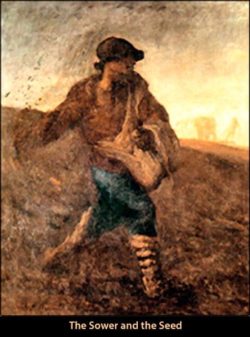The text is below the video…
“Sow what? Sow How?” Monday Meditation 5/18/20. Alan Neale.
Trinity Church, Newport, RI
Mark 4 Again he began to teach beside the sea. Such a very large crowd gathered around him that he got into a boat on the sea and sat there, while the whole crowd was beside the sea on the land. 2 He began to teach them many things in parables, and in his teaching he said to them: 3 “Listen! A sower went out to sow. 4 And as he sowed, some seed fell on the path, and the birds came and ate it up. 5 Other seed fell on rocky ground, where it did not have much soil, and it sprang up quickly, since it had no depth of soil. 6 And when the sun rose, it was scorched; and since it had no root, it withered away. 7 Other seed fell among thorns, and the thorns grew up and choked it, and it yielded no grain. 8 Other seed fell into good soil and brought forth grain, growing up and increasing and yielding thirty and sixty and a hundredfold.” 9 And he said, “Let anyone with ears to hear listen!”
And so begins one of the most famous of Jesus’ parables; immediately accessible upon first reading but then requiring thoughtful study and, ultimately, a response to a call for action.
We know that Jesus often taught in parables; it is an effective and respectful way to teach – effective because it “begins where the hearers are” (it is relevant) and respectful because ultimately the listener can pace and construct his own response.
Parables readily fit into the whole “Messianic Theme” in Mark’s Gospel (sssh, tell no-one what has happened) and the concluding words in verse 9 (“let anyone with ears to hear, listen”) accompany well this dynamic of “Do you see? Do you really see?”.
Before any study of the parable we need allow ourselves be challenged by these parable exchanges. We learn that the whole of our humanity, the minutiae of our daily lives are just overcrowded with opportunities to hear God’s voice. We learn that whatever we learn of/from Jesus must be integrated into our deepest being and, so very important, must lead to a change of course, a new path of action. An unhurried reading of Scripture will nearly always present us with a course of action… look for it, respond to it. And we learn that Jesus ever treats us with respect – he does not coerce, dominate, insist. His teaching in parables allows us time to reflect, process and act in measured pace given the uniqueness of our personal situations. There is no one size fits all in the Kingdom of God and in the economy of Jesus’ love for each of us.
In v.9 Jesus charges us to hear and to hear closely with attention; for this we must make some time and probably use notes to aid our memories. The Greek word for parable finds its origins in “expose oneself to danger”. It is truly is a wild and glorious (at times maybe even dangerous) thing to allow the Lord to confront us.
Note that seeing the crowd the first response of Jesus is to teach the crowd; probably this led to some disappointment and grumbling. “Teaching! We want food, we want signs and wonders.” But Jesus knew their deepest and eternal needs; please God we Christians and our churches will never forget this principle.
In the following Meditations I will be talking about the four soils on which the sower cast his seed (the path, the rocky ground, the weedy ground and the good soil) but, for today, let it be noted that the work of the sower was simply to “broadcast” the seed. The sower was not asked to undertake any fieldwork (!) studies as to how to identify good soil… his vocation was to sow and he did this well.
There are some church communities that tend to discriminate in a facile way between these different soils; they consider they are “sufficient” for such things. Friends, I believe strongly this is not the Anglican way (nor the way of our lavish, generous, inclusive God). We seek to develop contacts, make bridges whenever/however we can leaving it to the Holy Spirit to take a seed, to nurture it and then to bring it to fruition for cultivation. We may not always see the fruit of our sowing but we can trust the Spirit who in us has done such beautiful work.
Ecclestiastes 11:1 “Cast your bread upon the waters, and it shall return to you after many days.
And Isaiah 55:11 “My word that proceeds from My mouth will not return to Me empty, but it will accomplish what I please, and it will prosper where I send it.”
Let’s be ready to receive the Word, let’s be eager to share the Word.

